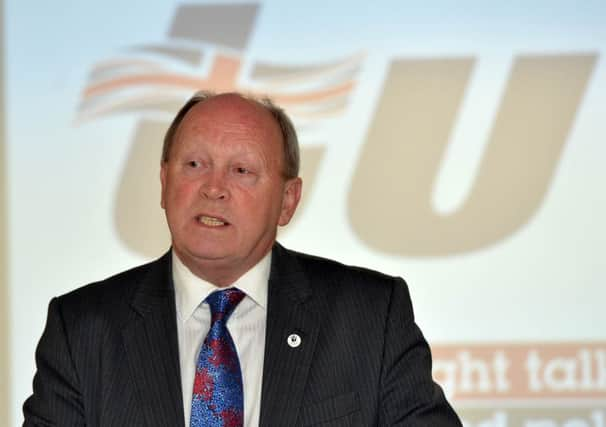TUV's vision for agriculture - Allister


Farming and the agri-food sector are key to the Northern Ireland economy, being the biggest contributor to sales, exports and employment within the manufacturing sector.
In TUV farmers have a friend, ever willing to fight their corner. The roller coaster impact of global pressures makes for an industry where stability in price is elusive, yet overheads constantly rise. In consequence farm incomes have tumbled, making growth a difficult aspiration and the targets of ‘Going for Growth’ increasingly ambitious. But, also making a food export marketing body a greater need than ever.
Advertisement
Advertisement
Obtaining greater stability in farmgate prices is key to success, with processors, banks and government all having to play their part. Hence, radical thinking should not be eschewed, though current EU competition laws probably prohibit the statutory minimum pricing that some desire. Outside the EU we’d be master of our own legislation and destiny.
With farming in crisis the truth is that the EU has done little to help, even refusing intervention when the milk price collapsed.
Getting out of EU would be liberating.
The false portrayal of Northern Ireland agriculture as wholly dependant on EU membership is frequently most notable for its failure to mention any of the following hard facts:-
*every penny we get from Brussels is some of our own money being recycled back to us and is but a mere fraction of the £20,000,000,000.00 the UK pays in every year;
Advertisement
Advertisement
*the EU itself has attacked local agriculture with crippling fines of €80m;
*more often than not when our industry is in crisis Brussels sits on its hands, as with its refusal to bring in intervention to deal with the catastrophic fall in the milk price;
*EU restrictions prohibit the UK government and Stormont from granting meaningful aid to farming because of EU “state aid” rules;
*Brussels strangles farming with hideous bureaucracy, cross-compliance nonsense and needless red tape;
Advertisement
Advertisement
*it is the EU which impedes several agricultural practices and imposes hugely expensive restraints, be it the Nitrates Directive, slurry spreading rules (imposing massive capital costs for storage facilities) or a myriad of other regulations imposed for regulation sake;
*EU agricultural spending is on a downward trajectory over coming years, coupled with an increasing bias towards Eastern and Southern Europe.
All of the above are part of the price our local industry pays at the hands of oppressive Brussels Diktats.
Shaking off the shackles of Brussels would not only be liberating for all industry, farming included, but it would restore the destiny of our country to our own hands; making our own laws and keeping and spending our own money. If government needed to support a sector then it could, free from the veto of Brussels and its “state aid” rules.
Advertisement
Advertisement
Given the centrality of agriculture to the feeding of the nation it is inconceivable that there would not be a national agricultural support scheme as required. Such would be in the interest of farmers and the consumer alike, because such support underwrites cheaper and safe food. Thus consumers and producers would require action when appropriate from government.
Far from, as some scaremongers suggest, our home market being flooded by lower-quality produce, for the first time as a nation in forty years we’d be empowered to impose our own tariffs and control our own trade, as the situation demanded it.
So, TUV has a vision for agriculture that is not hidebound by the ever tightening grip of EU bureaucracy but is set free by Brexit.